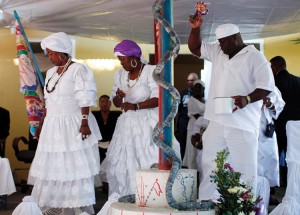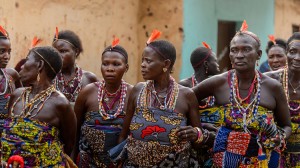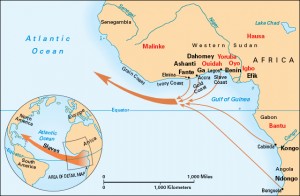Benin’s Vodou Day
Wednesday, January 10th, 2018January 10, 2018
Today, January 10, is Vodou Day, a religious holiday in the small west African nation of Benin. Often mistakenly associated with black magic (magic performed with the aid of evil spirits), Vodou (also spelled Voudou or Voodoo) is an official religion in Benin. Like other religions, Vodou has at its core a creator being as well as a number of spirits. Vodou’s set of beliefs, traditions, and practices are taken largely from traditional African religions as well as from Roman Catholicism. For followers of Vodou—known as Vodouisants—the religion is a way of life, and it influences art, culture, dance, language, medicine, music, and philosophy.
Vodou originated in Benin and nearby areas. Vodou comes from a word in the local Fon language meaning spirit. People forced into slavery brought the religion to Brazil, the Caribbean, and parts of the United States. (Vodou is also an officially recognized religion in Haiti.) Vodouisants believe that each person has a protector spirit, usually inherited from an ancestor. Protector spirits can reward individuals with luck or wealth. They can also punish people with misfortune or illness. Vodouisants believe that spirits commonly possess people and can speak, give advice, and tell stories about the past. Other Vodou spirits include zombies (animated or living corpses) and the mighty python god, Dangbe. Vodou rituals often include elaborate dances, costumes, music, and animal sacrifice. Natural oils, incense, and alcoholic drinks also figure prominently in Vodou ceremonies.

Followers of Vodou, called Vodouisants, participate in a memorial ceremony in Haiti. They wear white clothing to symbolize mourning. Africans brought Vodou beliefs to Haiti in the 1700’s. Credit: © Kena Betancur, Reuters/Landov
Ouidah, a city on the narrow Beninese coast, is the center of the nation’s Vodou Day festivities. Many thousands of Vodouisants gather at the city’s Point of No Return, a coastal monument to the millions of Africans who were enslaved and taken away to foreign lands. There, Vodou priests lead a number of ceremonies and rituals throughout the day. On Vodou Day, as well as throughout the year, the streets of Ouidah are adorned with Vodou symbols, statues, and fetishes (objects with spiritual or magical powers). The Musée d’Histoire d’Ouidah (History Museum of Ouidah) tells the tragic history of the slave trade in the area, but the museum is sometimes referred to as the “Voodoo Musuem” because of its extensive Vodou collections.




